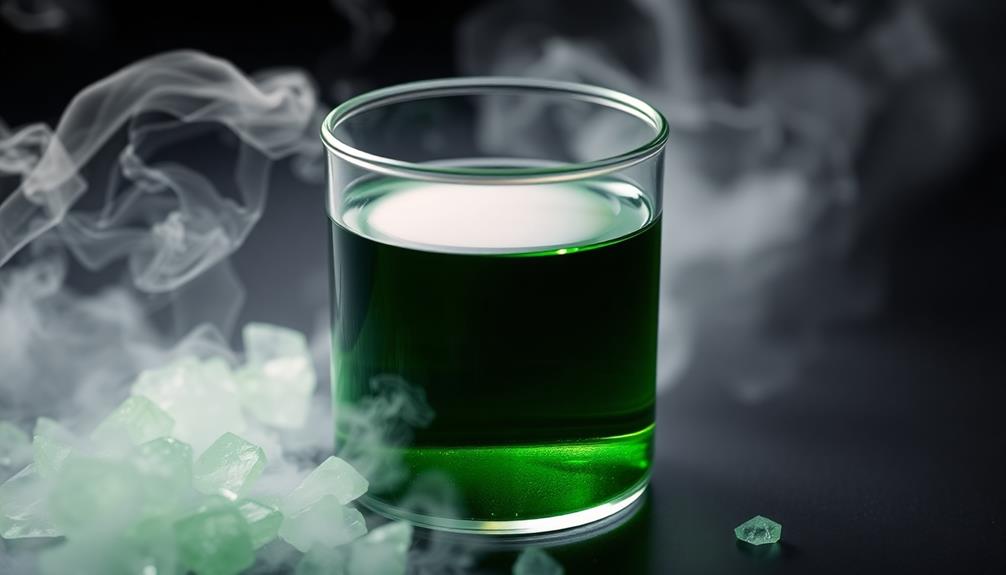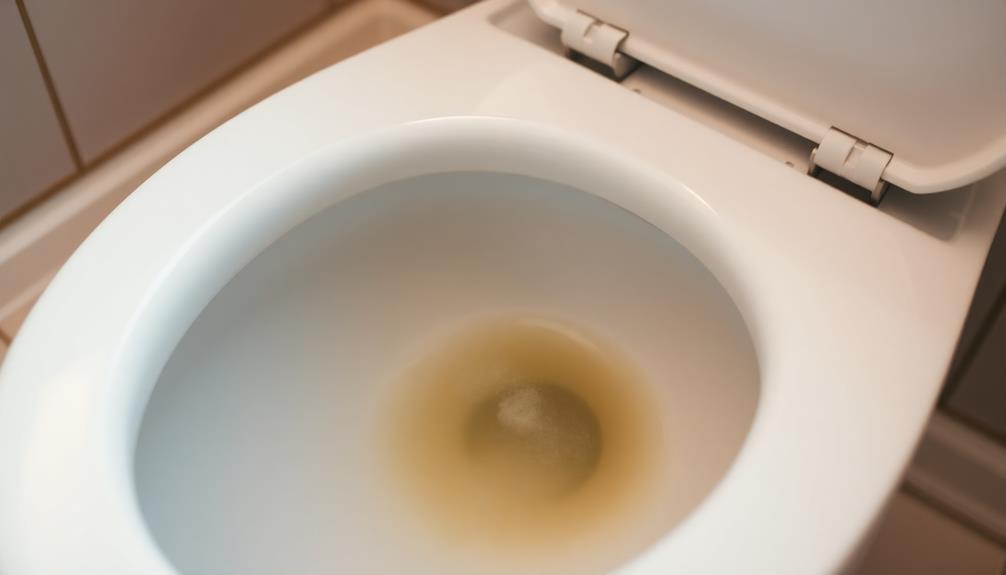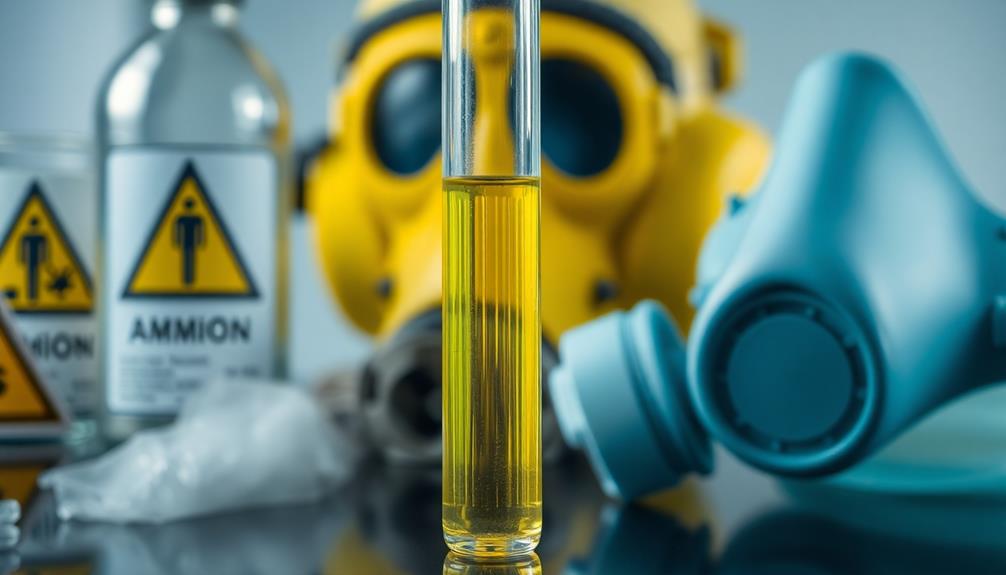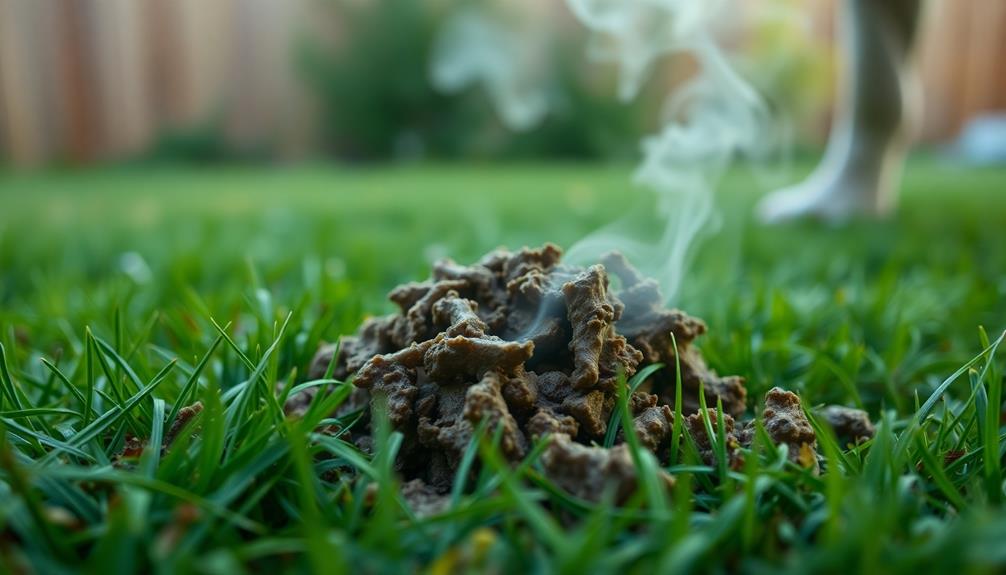When you notice an ammonia smell in your urine, it's usually pretty strong and pungent, often reminding you of cleaning products or stale urine. This smell can crop up when you're dehydrated, as concentrated urine has more waste to give off that odor. Eating a lot of protein can also add to the scent. Sometimes, if you have a urinary tract infection (UTI), you might notice this smell along with some discomfort. Staying hydrated helps dilute your urine and can reduce that ammonia scent. Keep exploring, and you'll uncover more about what different urine smells mean!
Key Takeaways
- Ammonia smell in urine is strong and pungent, often resembling cleaning products or stale urine.
- Concentration due to dehydration intensifies the ammonia odor in urine.
- High protein diets, particularly those rich in meat and eggs, can enhance the ammonia scent.
- Conditions like UTIs or bladder stones may contribute to an ammonia-like smell and discomfort during urination.
- Persistent ammonia odor should prompt a medical evaluation for potential health issues or dehydration.
Introduction

When you notice an ammonia smell in your urine, it can be surprising and even concerning. That strong, pungent odor often reminds you of cleaning products or stale urine. This smell happens when your body breaks down urea into ammonia, which usually occurs when you're dehydrated or if urine is concentrated due to holding it too long.
It's important to pay attention to your body's signals, as understanding them can help you maintain your health. For instance, just as supporting children through divorce emphasizes the importance of emotional expression, recognizing changes in your body's signals can be crucial for your well-being.
Your diet can also play a role in this smell. For example, if you eat a lot of protein, your body produces more urea, which may lead to a stronger ammonia scent. Additionally, health conditions like urinary tract infections (UTIs) or bladder stones can contribute to an ammonia-like odor because of changes in urine composition from bacterial activity.
If you notice a persistent ammonia smell, especially with other symptoms, it's a good idea to seek a medical evaluation. This can help rule out any underlying health issues.
Description of the Smell

You may often notice that ammonia-smelling urine has a strong, pungent odor that can be quite off-putting. This smell is similar to household ammonia or cleaning products, and it can catch you off guard.
When your urine is concentrated, often due to dehydration, the ammonia smell becomes much more noticeable. If you've had a long day without enough fluids, you might detect this strong urine odor.
Diet plays a role, too. If you consume a high protein intake, your body breaks down urea, which can enhance that ammonia scent. Additionally, urinary tract infections (UTIs) can contribute to an ammonia-like odor, often coming with discomfort during urination.
The good news is that hydration levels can help manage this issue. When you're well-hydrated, your urine is diluted, and the ammonia smell tends to fade.
Source and Composition

Ammonia in urine primarily originates from the breakdown of urea, a waste product created during protein metabolism in the liver. When your body processes proteins, urea forms and gets sent to your kidneys, where it's excreted in urine.
If you're dehydrated or your urine is concentrated, the presence of ammonia increases, leading to a strong smell. Color accuracy impacts overall image quality in visual presentations, just as hydration can affect urine composition.
In normal circumstances, urine contains about 2% urea. However, when you don't drink enough fluids or if you eat a high-protein diet, the concentration of urea rises. This means more ammonia is produced, which can make the smell more pungent. You might notice this especially if you've gone a while between bathroom breaks.
Your diet plays a significant role in how your urine smells. Certain foods and medications can influence ammonia levels too. Additionally, some health conditions can affect how your body processes waste, leading to variations in the smell and composition of your urine.
Typical Scenarios or Environments

In many typical scenarios, the smell of ammonia in urine becomes more noticeable due to specific conditions. For instance, when you're dehydrated, your urine may become concentrated, making that ammonia odor even stronger.
You might also notice it after a night of drinking, as alcohol can lead to concentrated urine too. Additionally, certain cold medications can affect your hydration levels, potentially altering the smell of your urine.
If you eat a high protein diet, especially foods like meat, fish, and eggs, you could also experience strong-smelling urine. This is due to the breakdown of protein in your body, which can release ammonia.
Sometimes, urinary tract infections (UTIs) can cause your urine to emit an ammonia scent. If you notice this, along with pain during urination, it's important to see a doctor.
Lastly, health issues like kidney disease or diabetes can change your urine's composition, leading to an ammonia smell. If you're experiencing these changes, it's a good idea to consult a healthcare professional.
Understanding these typical scenarios can help you recognize when the smell of ammonia in urine might signal something more significant.
Always listen to your body; it often knows when something's off!
Emotional or Cultural Associations

The strong scent of ammonia in urine often triggers a range of emotional responses, from concern to embarrassment. When you notice this smell, it might lead you to think about your health, hydration, and personal hygiene. You may even feel motivated to drink more water to avoid dehydration.
Some cultures view ammonia-smelling urine as a sign of poor health or dietary imbalances, prompting you to make dietary adjustments.
In certain cultural practices, people use the ammonia scent in urine as a way to assess their overall health. This can evoke feelings of discomfort, making you aware of your urinary health and the importance of regular check-ups.
It's fascinating how the smell of ammonia can influence societal views on health maintenance.
This connection between ammonia and health highlights how important it's to pay attention to what your body is telling you. By staying hydrated and maintaining good personal hygiene, you not only take care of your body but also feel more confident.
Health or Safety Considerations

Noticing a strong ammonia smell in your urine can raise alarms about your health and hydration levels. This odor often means your urine is concentrated due to dehydration, so it's essential to drink more fluids to stay hydrated. Keeping an eye on your hydration helps prevent strong ammonia smells and supports your overall health.
If the ammonia smell lingers, especially if you notice symptoms like pain during urination or fever, it could signal a urinary tract infection (UTI). This situation calls for a visit to your healthcare professional to ensure everything's okay.
Additionally, some medical conditions, like uncontrolled diabetes or liver disease, can change your urine's composition and lead to an ammonia smell. Regular health check-ups are key in these cases.
Sometimes, a high-protein diet can contribute to an ammonia odor, as it increases urea breakdown in your urine. Balancing your nutrition can help manage this.
Always remember, if you notice any unusual changes in your urine's smell, particularly if you experience flank pain or other symptoms, it's best to consult with a healthcare provider for further guidance.
Final Thoughts

A strong ammonia smell in your urine shouldn't be ignored, as it can signal dehydration or other health issues. When your urine has a pungent odor like cleaning products or cat urine, it often means you're dealing with concentrated waste. This can happen when you don't drink enough water, causing your body to break down urea into ammonia.
Certain foods, such as asparagus and garlic, can also add a sulfur-like smell to your urine, but if the ammonia scent is persistent, it might be time for a closer look.
Urinary tract infections (UTIs) and other medical conditions can intensify this odor, especially when you notice changes in color or consistency.
Pay attention to your body! If you notice that ammonia smell sticking around or if you have other symptoms, it's wise to seek a medical evaluation. Staying hydrated is key, so make sure you're drinking plenty of water.
Frequently Asked Questions
How Do I Know if My Urine Smells Like Ammonia?
You can tell if your urine smells like ammonia by paying attention to its odor after urination. If it has a strong, sharp scent, it may indicate dehydration or dietary factors that require attention.
How Would You Describe the Smell of Ammonia?
You'd describe the smell of ammonia as sharp and pungent, often reminiscent of cleaning products. It can hit your nose with intensity, leaving a strong impression that lingers in the air around you.
What Does Diabetic Urine Smell Like?
Diabetic urine often smells sweet or fruity due to excess glucose your body can't use properly. If you notice this odor, especially if it's strong, it's crucial to check your blood sugar levels.
What Illness Makes You Smell Ammonia?
If you're noticing an ammonia smell, it could be due to dehydration, urinary tract infections, or bladder stones. Poorly controlled diabetes and liver disease might also contribute to this odor in your urine.









